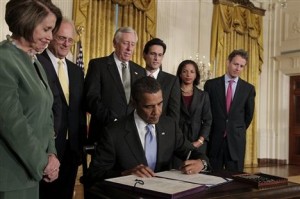Paul Pillar, a former top CIA analyst, examines the fight between Congress and the Obama Administration over more sanctions being proposed for the National Defense Authorization Act (NDAA) by Sens. Robert Menendez, (D-N.J). and Mark S. Kirk, (R-Ill.).
Prior to revisions, the Senators were pushing for [...]]]>
Paul Pillar, a former top CIA analyst, examines the fight between Congress and the Obama Administration over more sanctions being proposed for the National Defense Authorization Act (NDAA) by Sens. Robert Menendez, (D-N.J). and Mark S. Kirk, (R-Ill.).
Prior to revisions, the Senators were pushing for foreign countries to significantly reduce all non-petroleum sales to Iran and freeze Iranian foreign currency reserves — a potential death blow to Iran’s already ailing economy. Since then moves by the administration to weigh in on the passed senate bill indicate that the remaining measures — such as prohibiting the transport of Iranian energy products, banning shipbuilding and other industrial material sales to Iran — would still harm, or possibly end, prospects for diplomacy.
So why are Congress’ ongoing strangling initiatives (this would be the third round of measures implemented by the US this year) counterproductive? According to Pillar:
]]>It should be clear from the history of the past couple of years, as well as a little thought about incentives for Iranian policymakers, that simply piling on still more sanctions without more Western flexibility at the negotiating table will not attain the U.S. objective. The sanctions are hurting Iran and are a major reason Iran wants to negotiate a deal. But the Iranians have dismissed the only sanctions relief that has been offered so far as peanuts, which it is. They have no reason to make significant concessions if they don’t think they will be getting anything significant in return. If members of Congress were really interested in inducing changes in Iran’s policy and behavior, they would be devoting as much time and energy to asking why the powers negotiating with Iran evidently do not intend to depart much from their failed negotiating formulas of the past as they would in trying to find some new sanction to impose.
via Sanctions Law
This was a big year for sanctions. Although 2012 isn’t over yet and there is some pending legislation threatening to impose more sanctions against Iran and a forthcoming set of regulations from OFAC on some of the additional Iran sanctions we saw in the late summer/early fall, [...]]]>
via Sanctions Law
 This was a big year for sanctions. Although 2012 isn’t over yet and there is some pending legislation threatening to impose more sanctions against Iran and a forthcoming set of regulations from OFAC on some of the additional Iran sanctions we saw in the late summer/early fall, I thought I would recap some of the big sanction developments of 2012. I may update this list if additional events do come to pass.
This was a big year for sanctions. Although 2012 isn’t over yet and there is some pending legislation threatening to impose more sanctions against Iran and a forthcoming set of regulations from OFAC on some of the additional Iran sanctions we saw in the late summer/early fall, I thought I would recap some of the big sanction developments of 2012. I may update this list if additional events do come to pass.
December 31, 2011: President Obama signs into law the National Defense Authorization Act (NDAA) of 2012 (NDAA), which includes Section 1245, calling on the President to block all Iranian banks and the Central Bank of Iran.
January 23, 2012: Bank Tejarat is designated under Executive Order 13382 for its involvement in Iran’s weapons of mass destruction proliferation efforts. Tejarat was frequently used to initiate payments for U.S. exports of agricultural commodities, medicine, and medical devices. That same day the European Union (EU) institutes an oil embargo against Iran and targets the Central Bank of Iran for sanctions.
February 6, 2012: President Obama issues Executive Order 13599, effectively blocking all Iranian financial institutions.
February 23, 2012: Designations under the Transnational Criminal Organizations sanctions program applied to a number of individuals believed to be members of Brother’s Circle and Yakuza.
February 27, 2012: The EU applies sanctions to the Central Bank of Syria.
February 28, 2012: The first NDAA deadline passes.
March 15, 2012: EU prohibits SWIFT from providing financial messaging services to EU designated banks.
March 20, 2012: First NDAA exemptions are announced. Eleven (11) countries receive sanctions waivers.
April 23, 2012: The Grave Human Rights Abuses by the Governments of Iran and Syria Via Information Technology (GHRAVITY) executive order is issued.
May 1, 2012: Foreign Sanctions Evaders Executive Order is issued.
May 16, 2012: Yemeni Sanctions Executive Order is issued. EU suspends sanctions targeting Burma.
May 22, 2012: Belarus based JSC CredexBank is targeted as a financial institution of primary money laundering concern under Section 311 of the USA PATRIOT Act.
June 6, 2012: The United States Department of the Treasury’s Office of Foreign Assets Control (OFAC) announces $619 million sanctions settlement against ING Bank. The announcement marks the largest settlement in the history of OFAC.
June 11, 2012: 2nd NDAA exemptions are announced.
June 28, 2012: 2nd NDAA deadline concerning oil activity and public/private banks.
July 1, 2012: EU Oil Embargo against Iran goes into effect.
July 11, 2012: OFAC issues two general licenses which significantly ease U.S. sanctions targeting Burma.
July 17, 2012: U.S. Senate releases report and holds hearing on the activities of HSBC which includes evidence of money laundering and sanctions violations.
July 31, 2012: First designations under the Comprehensive Iran Sanctions Accountability, Divestment Act of 2010 (CISADA). Kunlun Bank and Elaf Islamic Bank added to the new Part 561 List. President Obama also issues Executive Order 13622 implementing further sanctions against Iran, specifically targeting the National Iranian Oil Company, and Naftiran Intertrade Company.
August 6, 2012: New York Department of Financial Services announces violations of banking laws and sanctions by Standard Chartered Bank.
August 10, 2012: The Iran Threat Reduction and Syria Human Rights Act of 2012 (“TRA”) is signed into law.
October 9, 2012: Executive Order 13628 issued. U.S. parent companies become liable for their foreign subsidiaries dealings with Iran.
October 11, 2012: MS-13 is designated under the Transnational Criminal Organizations sanctions program.
October 15, 2012: EU bans dealings between EU financial institutions and Iranian banks.
– Erich Ferrari an attorney specializing in OFAC matters. If you have any questions please contact him at 202-280-6370 or ferrari@ferrariassociatespc.com.
The US government has swept into action in the aftermath of the Palestinians’ overwhelming victory at the United Nations on Thursday. No less than three amendments were brought in the Senate, to be attached to the National Defense Authorization Act (NDAA) — a bill which has nothing to do [...]]]>
 The US government has swept into action in the aftermath of the Palestinians’ overwhelming victory at the United Nations on Thursday. No less than three amendments were brought in the Senate, to be attached to the National Defense Authorization Act (NDAA) — a bill which has nothing to do with Israel and the Palestinians, but is a high-priority bill that the Senate must pass, and as such is a perfect target for frivolous amendments).
The US government has swept into action in the aftermath of the Palestinians’ overwhelming victory at the United Nations on Thursday. No less than three amendments were brought in the Senate, to be attached to the National Defense Authorization Act (NDAA) — a bill which has nothing to do with Israel and the Palestinians, but is a high-priority bill that the Senate must pass, and as such is a perfect target for frivolous amendments).
Two of the amendments are purely partisan and with a Republican minority in the Senate, they are unlikely to pass. The third, however, is bipartisan and the leading Democrat sponsoring it is Charles Schumer (D-NY) whose position as the Democrats’ lead fundraiser means he gets his senate colleagues’ attention. The partisan amendments are somewhat more draconian than the bipartisan one, which will make the bipartisan amendment look relatively moderate, thereby increasing the chances of its passage.
Along with Schumer, the amendment is sponsored by Lindsey Graham (R-SC), John Barrasso (R-WY) and Bob Menendez (D-NJ). It calls for the closure of the Palestine Liberation Organization’s (PLO) office in the US unless the Palestinians return to talks with Israel. No timeframe is given for the return to talks, nor is there any mention of anything Israel must do to make that return politically feasible for the Palestinians. This amounts to an attempt to force the Palestinians back into talks on Bibi Netanyahu’s terms, which, as I explain here, would be political suicide for the Palestinian Authority (PA).
The more important clause, however, would end all aid — with no provision for a presidential national security waiver — to the Palestinian Authority if it or any entity “that purports to represent the interests of the Palestinian people” should ever bring a case, or even support one brought by someone else, that the International Criminal Court (ICC) adjudicates. Access to the ICC is the biggest tangible gain the Palestinians got from their upgraded UN status, and this amendment is an attempt to ensure that it is useless. Significantly, according to the way the amendment is written, the aid cutoff would be automatically triggered even if the Palestinians support another case or if some other entity brings a case on the Palestinians’ behalf.
This may be only the beginning of legislative activism aimed at punishing the Palestinians for their UN move. The American-Israel Public Affairs Committee (AIPAC) also issued a memo that echoed the condemnation of the Palestinian action from US officials starting with President Obama; painted an extremely distorted picture of the circumstances around and meaning behind the PLO’s move; and made a list of “recommendations” for the US government to follow. These include pressuring Mahmoud Abbas to refrain from similar actions in the future, “…demonstrate to the PLO that unconstructive unilateral actions have consequences;” close the PLO office in DC; and threaten aid to the Palestinians.
It’s standard procedure for such bills that AIPAC be at least consulted on its contents and this certainly would have been the case for a response to the UN vote. The presence of AIPAC talking points in the bill leaves little doubt about its influence; the fact that AIPAC’s own statement is much broader implies this is not the end of such legislation. In announcing their memo, Ron Kampeas at the Jewish Telegraphic Agency reports that AIPAC in fact called for a “full review” of the U.S. relationship with the PLO.
AIPAC tries to push a point frequently made in the run-up to the UN vote — that Congress will cut off all aid to the PA if the PLO pursues gains at the UN. In fact, Congress has only mandated such cut-off if Palestine becomes a full member state of the UN, something the US can easily prevent because it requires Security Council certification. Still, it is clear that AIPAC is determined to punish the Palestinians in some way. Whether or not they are willing to risk the PA’s collapse — something the Obama Administration certainly wants to avoid, as does, quite likely, the Netanyahu government (at least currently) – remains to be seen.
Even granting that there was a good deal of lead time before the UN vote, it’s still worth noting how quickly Congress jumped to respond. It would be nice if they were so quick to respond to matters that are far more pertinent to US citizens, like, oh, the “fiscal cliff” for example. Maybe we can get AIPAC to push them on that.
- Mitchell Plitnick is the former Co-Director of Jewish Voice for Peace and former Director of the US Office of B’Tselem. You can follow him on Twitter at @MitchellPlit or at his blog, The Third Way.
]]>